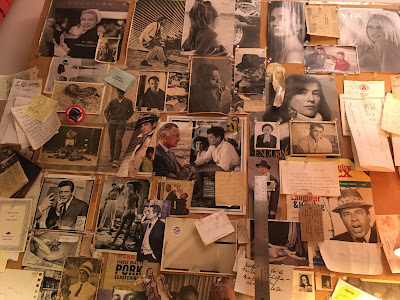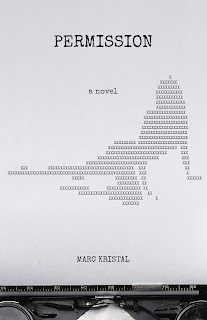Welcome to another installment of TNBBC's Where Writers Write!
This is Marc Kristal.
Marc has authored, co-written or contributed to more than forty books, notably Re:Crafted: Interpretations of Craft in Contemporary Architecture and Interiors, Immaterial World: Transparency in Architecture, and The New Old House: Historic and Modern Architecture Combined. His journalism has appeared in numerous publications, including the New York Times, Architectural Digest, Wallpaper, Metropolis, and Dwell. Also a screenwriter, Kristal wrote the 1990 feature Torn Apart, and created the script for Saigon ‘68, which received the 2013 Best Documentary award at the L.A. Shorts Fest and the CINE Special Jury award. He lives in New York. https://marckristal.com/
Where Marc Kristal Writes
When I met
my wife, nearly forty years ago, she was living in a prewar studio apartment
that she’d rented in Manhattan’s Chelsea district in the mid-1970s. Though it
may be hard to imagine today, given the neighborhood’s multimillion-dollar
steam-cleaned townhouses, ever-changing cavalcade of theme-y restaurants and,
most dismayingly, the conversion of the Chelsea Hotel into ‘luxury condos,’ the
area was pretty dicey back then, with Eighth Avenue a random bricolage of gay
and dive bars, Cuban diners, and sex shops, and Ninth the turf of the lower west
side projects. For these reasons, my wife paid a stabilized rent in the low
three figures, for what was, the building’s decrepitude notwithstanding, a
pretty nice setup. The main room was ‘sunken’ – i.e. two steps down from the
entry/dining area – the windows overlooked a series of well-tended townhouse
gardens, and the place was dead-quiet, an especial bonus for someone who, as
the saying goes, can hear a fish fart.
Once we started living together, I
began using her place as a writing studio, an arrangement that lasted for about
25 years. Alone, undistracted, at peace, I produced, in that situation, about
80 percent of my life’s work – two dozen screenplays, half as many architecture
and design books, hundreds of articles, a play or two and, after a decade of
wandering in a creative wilderness, a novel.
About fifteen years ago, I was
evicted. The building was sold, the crocodiles who bought it took everyone to
court, and as our actual residence was elsewhere (and despite the fact that I
spent six days and several nights a week there and had for decades), we were in
violation of the city’s rent-stabilization laws, we would have lost at trial
and couldn’t afford a lawyer in any case. It is not an overstatement to say
that this constituted the most traumatic loss of my professional life. It was
over.
From there, I migrated six blocks
north, to 28th Street, the heart of Chelsea’s Flower District. A
charming block: every morning in all weather, the merchants would set out
whatever was in season – mums, tulips, impatiens – in pots and buckets along
the sidewalk, which made for a challenging walk and an unmixed pleasure for the
soul. My twelve-by-twelve-foot room, which looked across an airshaft through
uncleanable windows into a sweatshop, shared walls, floor and ceiling with four
recording studios, all specializing in rap and hip-hop. I set up a little
kitchen, did the breakfast dishes in the men’s room, hung some photos, and laid
in a supply of Quies wax earplugs, The Writer’s Best Friend. The rent was
double what I’d been paying, still not very much, but you noticed when you
wrote the check. I lasted just under a year. I couldn’t deal with the 24/7 thud
of the sub-woofers, above, beside, beneath.
And yet. Once I put up a wall-size corkboard and pinned up pictures of my pals (Alain Delon, William Kentridge, Patricia Highsmith, Brigitte Bardot, and others), I felt like I’d taken ownership of the space. Two walls are covered in bookshelves, so if I dry up and want to refresh myself by dipping into my betters, they’re all within half an arm’s reach. The commute could not be shorter, though you have to make sure to get out a few times a day or risk turning into Miss Havisham or Howard Hughes (without the money). It’s cheap. It’s cozy. And as I am opposite the bathroom, it might be said that I have a water view.
This is not how I expected to end my
creative days (and hopefully it won’t be) and given that things are so
constrained, I am less productive. But I still show up for work every morning,
and as every writer knows, once you get down to it, the world falls away. I’m
in a closet, but I could be anywhere.
There are a number of personal items in here keeping me company. Perhaps the most important is a postcard I purchased a few years ago, in the gift shop at the Anne Frank House in Amsterdam. It is a photo, by Arnold Newman, of Otto Frank, standing in the attic of the family hiding place – the Secret Annex – on 3 May 1960. It had been Frank’s decision to remain in hiding in the city rather than flee, and he was the only member of his family to survive the war. Which meant that, as he died in 1980, at 91, Frank had 35 years in which to ponder the consequences of his choice.
The postcard sits directly in front of me on the desk, unavoidable – a constant reminder of how fortunate I am, to have a place of my own to work, to do what I love, to have had it so good, so easy, for nearly seventy years. A constant reminder to, as the saying goes, count my blessings. Things could be worse.
Set in 1990s Los Angeles, Permission tells the
story of a screenwriter on the brink of success, derailed by a destructive
marriage that drives him into a breakdown. Medicating his condition with a
bottomless plunge into prostitutes and cocaine (his unlikely vehicles for self-analysis
and personal revelation), he uses what he learns – and the new relationship he
finds in this underworld – to come to terms with his nature, and to change his
life.
Comic and horrific, shockingly explicit yet tender and lyrical, Marc Kristal's uncompromising,
unforgettable novel is about the ways in which we create identities that let us
overcome and hide from our fears, what happens when those selves crash into
their limits – and how the worst sort of chaos can lead, in the end, to the
best outcome.
https://www.amazon.com/Permission-Marc-Kristal/dp/1639882022/






No comments:
Post a Comment